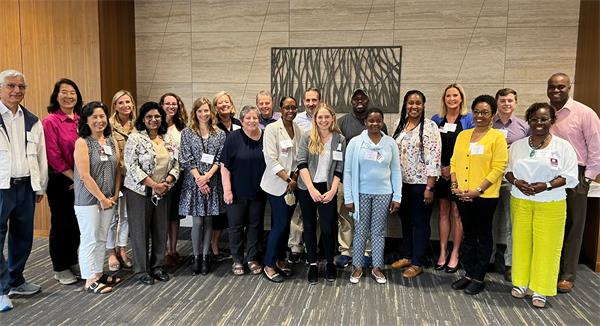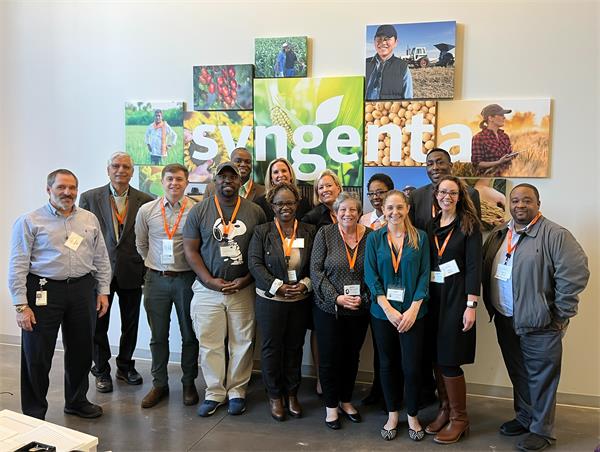
Members of the North Carolina Higher Education Faculty
and Mentor Network at NIEHS on May 19, 2023
If you have ever wished the next generation could have a stronger understanding of your profession and a greater appreciation for the field of toxicology and that more young people might follow in your professional footsteps, you are not alone.
In developing the SOT 2019–2023 Strategic Plan, SOT Council determined that a strategic priority would be to increase the Society’s influence through science communication (Strategic Priority C). Following the adoption of the Strategic Plan, in 2019, SOT Council identified audiences (legislators and educators), developed key messaging, and formulated a strategy (Strategic Objective C1) to engage key influencers and to increase the recognition and appreciation of toxicology as a science that can have a major, positive influence on human and environmental health.
To advance this strategy, the Society partnered in 2020 with the North Carolina Association for Biomedical Research (NCABR) and the SOT North Carolina Regional Chapter (NCSOT) to develop a train-the-trainer program for undergraduate science educators in North Carolina. This program provided undergraduate teaching faculty with training, instructional resources, and support from SOT, NCSOT, and peer faculty and volunteer mentors to increase educator awareness and understanding of toxicology so that educators would incorporate this knowledge into their teaching. Ultimately, the objectives of this project were to:
- Increase the usage of curriculum materials in North Carolina undergraduate science courses that address the importance and meaning of toxicology
- Increase North Carolina undergraduate student involvement in local and national SOT programs
- Increase North Carolina undergraduate usage of SOT educational and mentoring resources
- Increase awareness of toxicology as a career opportunity among undergraduate educators and students
To this end, SOT, NCSOT, and NCABR launched a pilot program, the North Carolina Higher Education Faculty and Mentor Network, in 2020. Over the past three years, this group has grown to include 52 teaching faculty, faculty mentors, and mentors from industry and government, representing 25 organizations in North Carolina. Many in this group were unfamiliar with SOT prior to joining the network, and it was through this initiative that they became aware of the Society’s programs, educational resources, and career support offerings. It also was through this initiative that a fleet of resources—webinars for undergraduate faculty, recorded programs for undergraduate students, template resources, and lessons learned—were developed and can be shared with others looking to heighten awareness around SOT and the field of toxicology with the nation’s undergraduates. While the collaboration with NCABR officially ended June 30, 2023, NCSOT will build on the momentum that increased with each network meeting to continue outreach and support for the group in the days ahead.
The North Carolina Network: How We Made It Happen

The North Carolina Higher Education Faculty and
Mentor Network at Syngenta Crop Protection in
Research Triangle Park, North Carolina, on January 6, 2023
The goal of the first program year (2020–21) was to establish the network’s focus and recruit inaugural members from organizations within North Carolina. To accomplish this goal, NCABR developed and recruited a 14-member Network Leadership Council representing SOT, NCSOT, North Carolina universities, government, and industry. This group guided network messaging, program offerings, and the network invitee identification and recruitment process. NCABR also coordinated with SOT to offer the ToXchange platform for network member communication and resources.
To recruit Network members, we developed two fact sheets:
- The first fact sheet described to teaching faculty the opportunity to enrich undergraduate science courses and career planning.
- The second fact sheet described to mentors the opportunity to promote toxicology and mentor undergraduate faculty and students.
Throughout the 2020–21 academic year, we hosted network launch meetings and Leadership Council meetings. The network also provided webinars for undergraduate and graduate students.
The goal of the second program year (2021–22) was the development of program content for the existing network members. This goal was accomplished by developing seven recorded and freely available Toxicology Curriculum Webinars to introduce core concepts of toxicology into undergraduate instruction. Led by SOT members Joshua Gray, PhD, US Coast Guard Academy, and Mindy Reynolds, PhD, Washington College, and based in the SOT Toxicology Learning Framework, the webinars addressed:
- Core Concepts in Toxicology
- Core Concepts of Evolution
- Core Concepts of Biological Information: Toxicology and the Genome
- Core Concepts of Pathways and Transformations of Energy and Matter
- Core Concepts of Systems Toxicology
- Core Concepts of Risk Assessment
SOT also hosted an Undergraduate Toxicology Discussion Group on the ToXchange platform to facilitate discussion before and after each webinar.
In the third and final program year (2022–23), our goal was to offer in-person programming for the first time and to recruit additional members to join the network and benefit from SOT resources. In this final program year, the network doubled in size. In addition to ongoing virtual meetings, two in-person meetings provided SOT/NCABR program overviews, lunch, and discussion about what network members would like to glean from the network. The meetings also provided tours of research facilities, presentation of SOT resources, and roundtable discussions about how to incorporate toxicology principles into undergraduate instruction.
Program Assessment
We conducted ongoing evaluation of network programming and meetings to determine effectiveness, relevance, and areas of improvement to ensure goals were successfully met. This was a vital part of building a strong and successful network. The final program report for this network now serves as a blueprint for developing similar networks nationwide.
Those interested in developing a network in other regions of the country are encouraged to review the North Carolina Higher Education Faculty and Mentor Network online resources and the project’s final report, and you are encouraged to contact me, NCABR President Suzanne Wilkison, or SOT Education Director Betty Eidemiller with questions or for ideas and lessons learned.
#Communique:SOTNews